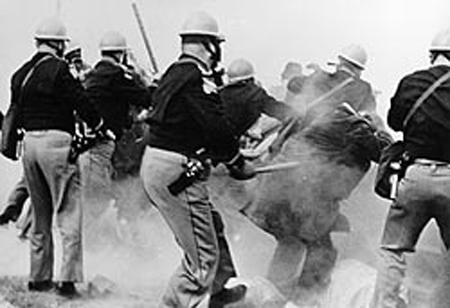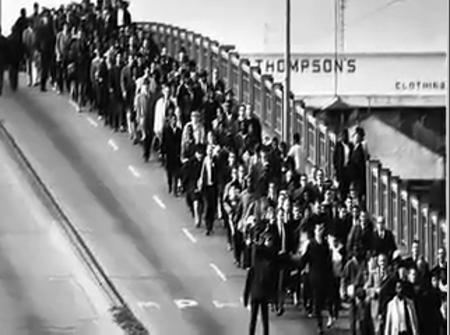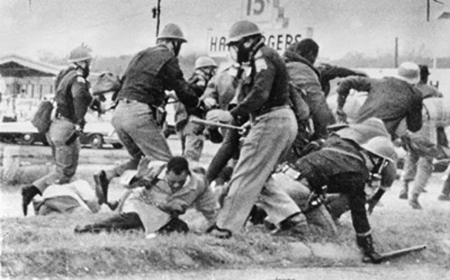As reported by the Alabama Media Group, "The 1965 Voting Rights Act: Born in Alabama and died in Alabama?" by Charles J. Dean, on 25 June 2013 -- BIRMINGHAM, Alabama – In early March Rep. John Lewis of Georgia stood near the foot of the Edmund Pettus Bridge in Selma and, as he has done for decades, remembered Bloody Sunday.
That is the iconic name given to March 7, 1965, when Lewis and others were attacked and beaten by Alabama state troopers and Dallas County sheriff deputies as they attempted to begin a march over the bridge and a trip to Montgomery to press for the right to vote.

Most know the story. The attack galvanized the Civil Rights struggle. From it a straight line emerged from an Alabama bridge named for a confederate general to the Congress, which later that year passed the 1965 Voting Rights Act. From Congress the line extended to the White House where President Lyndon Johnson, with John Lewis watching, signed the act into law.
That law is widely considered to have been the most important and most successful act of the Civil Rights movement.
On Tuesday, the U.S. Supreme Court essentially declawed it, ruling that a key provision of it was old and out of date and needed to be updated by a Congress not likely to do it, most observers believe.

For Lewis the decision provided both an answer to a question he was asked on the bridge in March and then an observation he made himself about the then pending challenge to the old law, a challenge that came from Alabama's Shelby County. Lewis, a native of Alabama, was asked if he was concerned the law might be struck down.
"...I am worried that some will believe we no longer need the vigilance the law provides," said Lewis. "... I'm worried some who look at history see it as a circle that must one day close as opposed to a line that moves forward. I think we're going to find out if a majority of the court believes history needs to keep rolling out or if the circle needs to close."
Tuesday's 5-4 decision by the court closed the circle on the law unless a deeply divided Congress acts.
After the decision Lewis said he was dismayed by the ruling and summed up his reaction this way:
"What the Supreme Court did was to put a dagger in the heart of the Voting Rights Act."

Rep. Terri Sewell, D-Birmingham, said this: "Today's Supreme Court ruling is a major setback for voting rights in this country."
Sewell noted the irony of Tuesday's court ruling.
"It is terribly ironic that the state responsible for the enactment of the Voting Rights Act is now being used by the Supreme Court to dismantle the core of that act," said Sewell.
State Sen. Hank Sanders, D-Selma, was angered by the decision.
""I think it's the most destructive decision the Supreme Court has rendered in 50 years," said Sanders.
Alabama Gov. Robert Bentley issued a statement saying Alabama will not tolerate discrimination but also said, "Alabama has made tremendous progress over the past 50 years, and this decision ... recognizes that progress."
Rep. Mike Hubbard, speaker of the Alabama House of Representatives also issued a statement after the ruling.

"The Alabama of today is vastly different than the one of a half century ago, and the time for us to be freed from the burden of federal oversight is long overdue," said Hubbard. "Today's ruling clearly states that our constitutional rights as Alabamians take precedence over the wants and whims of liberal Justice Department bureaucrats in Washington, D.C. Starting today, Alabama will be able determine its own destiny when it comes to campaigns, elections and voting procedures in our state."
President Barack Obama Tuesday issued a statement after the decision was handed down saying he was "deeply disappointed" by it and called on Congress to pass laws to ensure every American has equal access to the polls.
In March of 2007 then Sen. Obama traveled to Selma as a presidential candidate to celebrate the 42nd anniversary of Bloody Sunday. He was not alone. Then Sen. Hillary Clinton, also seeking the presidency came as well. And, so did former President Bill Clinton.
This year Vice President Joe Biden came to Selma, along with U.S. Attorney General Eric Holder.

That's all evidence of the special place Selma holds in civil rights history and Alabama holds, said historian Taylor Branch, who is best known for his landmark trilogy on the civil rights era.
"The next three years mark fiftieth anniversaries for hosts of important civil rights era moments, critical moments that shaped the nation. And, in so many of those moments Alabama stands at the center from Birmingham to Montgomery to Tuscaloosa and most especially to Selma," said Branch. "Selma is where the world finally watched on their TV's the brutal face of oppression in the Deep South. It's why you see politicians and leaders come back to Selma over and over. ...I think it's beyond ironic that the state that is home to the most important piece of legislation in the civil rights era could turn out to be the state that mounts the challenge that could kill it." (source: Alabama Media Group, "The 1965 Voting Rights Act: Born in Alabama and died in Alabama?" by Charles J. Dean, on 25 June 2013 )

QUANTUM BINARY SIGNALS
ReplyDeleteGet professional trading signals delivered to your mobile phone daily.
Start following our signals today & gain up to 270% a day.